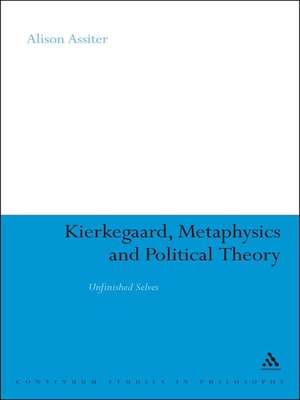Kierkegaard, Metaphysics and Political Theory
ebook ∣ Unfinished Selves · Continuum Studies in Philosophy
By Alison Assiter

Sign up to save your library
With an OverDrive account, you can save your favorite libraries for at-a-glance information about availability. Find out more about OverDrive accounts.
Find this title in Libby, the library reading app by OverDrive.



Search for a digital library with this title
Title found at these libraries:
| Library Name | Distance |
|---|---|
| Loading... |
Alison Assiter argues that the notion of the person that lies at the heart of the liberal tradition is derived from a Kantian and Cartesian metaphysic. This metaphysic, according to her, is flawed and it permeates a number of aspects of the tradition. Significantly it excludes certain individuals, those who are labelled 'mad' or 'evil'. Instead she offers an alternative metaphysical image of the person that is derived largely from the work of Kierkegaard.
Assiter argues that there is a strand of Kierkegaard's writing that offers a metaphysical picture that recognises the dependence of people upon one another. He offers a moral outlook, derived from this, that encourages people to 'love' one another.
Inspired by Kierkegaard, Assiter goes on to argue that it is useful to focus on needs rather than rights in moral and political thinking and to defend the view that it is important to care about others who may be far removed from each one of us. Furthermore, she argues, it is important that we treat those who are close to us, well.
Assiter argues that there is a strand of Kierkegaard's writing that offers a metaphysical picture that recognises the dependence of people upon one another. He offers a moral outlook, derived from this, that encourages people to 'love' one another.
Inspired by Kierkegaard, Assiter goes on to argue that it is useful to focus on needs rather than rights in moral and political thinking and to defend the view that it is important to care about others who may be far removed from each one of us. Furthermore, she argues, it is important that we treat those who are close to us, well.







